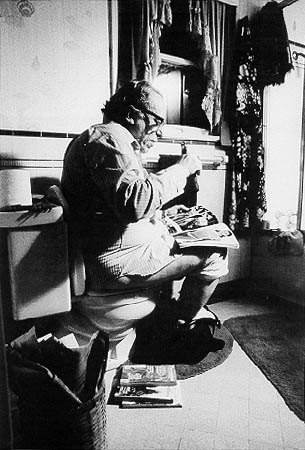Cory Doctorow and his daughter, Posey, have a regular sushi date. “Every week or two, we visit a different sushi restaurant, usually near our place in Burbank, and have a (usually) fantastic meal. We bring along a little notebook and take notes and keep scores on everything we try, and then (usually) we give the restaurant an overall rating.” They call it the Sushi Chronicles. What a cute idea.
review
Coin
My friends over at the Copper Nickel (a literary journal published by the students and faculty at the University of Colorado Denver) have recently launched Coin. Coin is an off-shoot site where you will find samples of work that have been published in Copper Nickel. These samples are accompanied by interviews, conversations, book-reviews, and audio and video presentations and documents that don’t fit well into the format developed for Copper Nickel.
The first issue includes poems from Dan Albergotti, Sandy Florian, Ed Pavlic, and Ginny Hoyle, Snezana Zabic’s essay “Meet Satan,†and a portfolio of work by and about Michael Copperman, specifically interesting are his comments in “Race, Authenticity, Culpability” accompanying his unconventional “It“.
SLAYER!
I get to check another goal off the old life list.
Having missed out on a couple opportunities in the past I finally had my chance to see Slayer at Magness arena. It was the loudest show I have ever seen (by far). Forget amps that go to 11, Slayer’s go all the way to 666. It was a full-on sonic assault on my ears and I loved it. They started off with two songs and then pummeled there way through the entire Seasons In The Abyss album. The encore whipped the crowd into a frenzy with “South Of Heaven”, “Raining Blood,†“Aggressive Perfector†and show closer, 1986’s brutal and harrowing “Angel of Deathâ€. I can’t wait to see them again.
…
Pure
I should start by pointing out that Rebbecca Ray was only 16 years old when she began writing Pure, and it shows. However, this isn’t necessarily a bad thing. Because the novel is about adolescence, Rebbecca Ray’s age while writing the novel keeps her closer to the subject matter. At the same time, her age often shows in her unpolished writing via some shallow characterization and a very poor ending. Pure is an admirable first effort for such a young writer and a decent cotton candy read but it is by no means a fantastic or important novel. I may have found this book more interesting than most due having enjoyed other, better novels with similar themes involving female adolescence.
Our unnamed narrator is a 14-year-old girl who is struggling desperately to find her place. She’s struggling to feel anything at all, really. The story begins with what appears to be a relatively normal British kid with problems the typical problems of peer acceptance, minor family problems, and just wanting to grow up. As the story moves forward we find that our main characters life is more complicated and not nearly as normal as we first expected. The narrators emotional ambiguity and sad apathy seem tip prove the helplessness of adolescence. The uncertainty of how to judge what is happening to her seems to the most poignant and truthful theme in the novel and that also of our teenage years that provide so many new experiences. As thing in her life become more complicated, problems with her parents escalate. When her overbearing father and ineffectual mother fall further apart, their 14-year-old daughter begins dating a man over twice her age. She allows, then craves abusive relationships and before long her feelings of self-loathing become self-destructive: hurt becomes love, repulsion becomes sexy, and pain is part of fitting in.
This novel harbors very little joy and it’s not sensational or sentimental. But being along similar veins of Perks Of Being A Wall Flower and Kids, this book is interesting in that it is both fascinating and upsetting to look at how growing up has changed for the modern child. You wince for the girl in this book, but you also relate; remembering what it was like, having been in that cool basement, on that lumpy couch, wondering if they actually like you back or are just fumbling toward an incomprehensible and obscure maturity too.
White Noise
Back in highschool, me and my friend Les would often stand in the hallway near our lockers during passing period and stare out the door. We wouldn’t talk to each other. We were too busy listening and didn’t want to interrupt what we were hearing: the sound of 400 students gossiping, spilling books, taunting, laughing, slamming lockers, eating snacks, chasing each other, smacking gum, copying homework, making out, tearing pages out of notebooks, etc. When we didn’t focus on one sound at a time but the on whole sound: a low penetrating, ominous, rumble would emerge. It was a hum you would hear only if you knew it was there. Soon, we noticed this could be done almost anywhere. It fascinated us, how this sound seemed to stand on its own, beyond the individuals creating it. Les was the only one I had ever told about my listening to this sound. I think because I thought he would be one of the few I knew who could appreciate it. To this day I could walk up behind Les and hum, and he’d know exactly what I was referring to: white noise.
As a close friend of pop culture, it’s very surprising that I thought Don DeLillo’s White Noise was, in a word, boring. At least mostly boring. The novel held some appealing wit. The scene with like the “Most Photographed Barn In America”, the near plane crash, and some of Jack Gladney’s conversations with his family I found really amusing in DeLillo’s dark and dry way. And though at times the novel produced a disturbed chuckle from me, I wouldn’t say that it was hilarious or even funny, really. In fact much of the time it was annoying and tedious. Yes, this novel was clever, but despite having many facets, it was not fascinating.
It’s true that the meat of DeLillo’s White Noise is held in its observations, not in its plot. But the story held almost no plot. The main character in White Noise tells us that all plots move deathward. Is it a valid reason for Delillo not to include a plot in this novel? I don’t think so.
It could very well be that I have become so accustomed to the torrent of information, often useless, swirling around me that I don’t think that the racket that it creates is worthy of a novel itself. Let alone bothering to read that novel. White Noise seems to be just more white noise. It’s not lost on me that may be exactly what DeLillo had intended.
I did enjoy the cultural themes presented in the novel. DeLillo reveals to us how we as participants in American culture are often more interested in the copy than in the original. We as a culture reject the real event in favor of the simulation. Representation supersedes experience. I also enjoyed the idea that death seems to be the only concept that can equal our society’s white noise in sheer force. And despite popular culture using glitz, packaging, and showiness in an attempt to hide death beneath the surface, death is in the end, inevitable. Despite what DeLillo is trying to portray, I don’t think death has disappeared from american culture, my death clock is testimony to that. Maybe I’m missing something. On the other hand, maybe I get it.
Is Don DeLillo’s novel White Noise high-end art? Maybe. Enjoyable? Maybe not.
…
My Life Without Me
Last night I watched My Life Without Me (trailer can be found here). What a tear-jerker that was. I was a sniffling mess for a while there. I can’t remember who recommend this movie to me, but they said my Big List reminded them of it. Anyway, thanks whoeveryouare, it was really enjoyable. I thought it was a great movie, if not a bit depressing and a little manipulative, it really moved me. There are plenty of bad reviews out there for this movie, this isn’t one of them. I thought Sarah Polley did an incredible job. The stylization was just up my alley and the soundtrack was great to boot. The selfishness of the main character was lost on me till I started reading some negative views.
I also really enjoyed it because it correlated with the book I’m reading right now: White Noise by Don DeLillo. Both stories (the movie and the book) deal with the ever looming spectre of death, specifically terminal illness. They both deal with how we act when our time on earth becomes specifically finite. Neither of the characters (in both the movie and the book) choose to tell their spouses or their children. Is that OK to do? Are we obliged to tell our loved ones if we are going to die in two months? Are we saving them any suffering if we don’t? In addition, both main characters deal with issues of infidelity which draws even more parallels between the two stories. Anyway, I totally recommend the movie (as long as you don’t mind a good cry) and I’ll let you know about the book when I finish it.
True Stories
I’ve basically been snowed in the for the last few evenings. We only got like three or four inches worth over the last couple of days, not enough to actually snow anyone in, but it was enough to keep me from wanting to go out. I spent some of my recent indoors time staying late at working and doing some design stuff.
The night before I watched a really cool flick called True Stories. First off this movie was starred in and directed by David Byrne. And being a huge fan of both his music and his artwork may have effected my opinion of this movie, but I thought it was great. It was “A film about a bunch of people in Virgil Texas” who are observing the states sesquicentennial: the 150th anniversary and “a celebration of special-ness”. David Byrne did a wonderful job with his perfect alliteration, straight face, and odd-ball comments – “This car is not a rental. It’s privately owned”. Yet, he still makes his unabashed annotations on mass-consumerism, fashion, architecture, corporate America, and marriage without being satirical (for the most part) without being pretentious. The quirky characters were incredibly entertaining. Make no doubt, this movie is a musical, with some of the songs written specifically for the film. My favorite was “Dream Operator” sung during the fashion show. Anyway, great flick, go rent it.
Running With Scissors
Augusten Burrough’s first memoir, Running With Scissors is a paradox. The novel is filled to the brim with the awfulness and horrors of modern life. Pedophilia, excessive drug use, child abuse, rape, animal cruelty, exploitation, abandonment, sexual deviancy, coprophilia, mental illness, and manipulation all have their place in this novel. But somehow, despite all of this dreadfulness and misery, Augusten’s story is heart wrenchingly hilarious. The entire novel is filled with hope and laughs. Any sort of pity for Augustus is always followed by at least a chuckle. And despite all of the abuse, very little of it is done with intentional cruelty. At no time is this book ever boring, it’s simply (or not so simply) intelligently crafted entertainment. But then again, I’m a rubber-necker at train wrecks.
After his insane mom and deadbeat, alcoholic father get divorced, Augusten is sent to live with his mother’s psychiatrist, Dr. Finch. Living at the Finch’s dilapidated home are a host of Dr. Finch’s patients, children, and “wives”, all providing Augusten with varying degrees of hopefulness and despair. By the end of the novel Burroughs discovers that during adolescence, without an adult around to tell you what not to do, freedom is just like being trapped.
Basically, Burroughs has created a wonderfully entertaining novel. I’d recommend this to everyone but my Grandma. Now, if you’ll excuse I’m gonna go perform some bible dips.
…
The Bone Palace Ballet
I was introduced to Charles Bukowski’s writing when I was a sophomore in college. Some hippie from Humbolt County came up to visit a roommate and told me to read him. I’m glad I listened. He is now one of my favorite authors. I fell in love with him almost immediately. That semester my drink, when we went out, was half-and-half whiskey and waters. I found myself going to the bar more, and paying attention to the people who were there. I saw the romance in dark, dingy, rent-by-the-week hotels. I fully realized the allure of the racetrack. I stayed away from the fighting though – I saw no cause to injure myself. I remember I saw a signed copy of his book in the library and schemed out a plan to sneak it past the alarms. However, shortly after I finished the plan and recruited the necessary accomplices, the library flooded and I graduated shortly after that. I still wonder if that book is there.
I’ve read all of his novels but Post Office. This is because I want something to hold onto. Something to read on my death bed. I’ve also read most of his short stories. Over the last few years, I’ve been in the slow process of reading his poems. I keep a book of them in the shitter with me and whenever I have to go bust out a few, I open the current book of poems and bust a few of those out too. A while back I just finished The Bone Palace Ballet, a collection of mostly newer poems that were put together posthumously. It was pretty good. Great shitter reading material. And you know what? I think Bukowski would take that as one of his best compliments.
…



